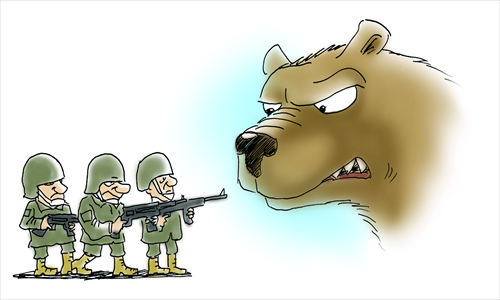Rapid Trident joint exercise will frustrate NATO’s aims, not further them

Illustration: Liu Rui/GT
Ukrainian and US troops on Monday launched a military drill involving 1,800 soldiers, mostly from NATO allied nations, near the war-torn country's Polish border. Rapid Trident, lasting for two weeks, is the largest multi-national drill held in Ukraine.
Flexing military muscle in the region can be of no help, but will threaten to derail the peace process concerning the deep internal crisis in Ukraine. The jointly military exercise delivers a clear message to Russia that Washington and its allies are determined to thwart any ambitions Russian President Vladimir Putin may have.
Washington and its allies have already tried different means to counter Russia, both economically and politically. Sanctions imposed against Moscow, consisting of asset freezes of some Russians and companies, as well as travel bans against certain officials, have resulted in hike of interest rates, the weakening of the ruble and an economic recession. Moscow has also been isolated from the international community politically after being barred from the G8, now the G7.
The West believes that the joint exercise launched at this point will force Kremlin to soften its stance on the Ukraine crisis. However, Washington and its allies will be disappointed.
The national sentiments in Russia have been rising to an unprecedented height. It is impossible that Putin and the Russian public will give in to the Western armed provocation. If NATO allies continue flexing their military muscle by expanding the scope of drills, it is certain that Moscow will respond by carrying out tough retaliatory measures.
Moscow has already warned of the explosive consequences of the ongoing military exercise in Ukraine and referred to such behaviors as NATO's provocative policy to unequivocally support the Kiev authorities. Soon after Rapid Trident kicked off near Ukraine's border, Russia announced its plan for live rocket fire drills in Crimea this Sunday.
Therefore, it is clear that the consequences of the Rapid Trident will run in a diametrically opposite direction from the wishes of NATO. It can trigger more frequent drills and intensify the tension in the region. This means the possibility of a real war will be higher than before, which may make the region one of the most combustible parts of the world. It is impossible to achieve security and stability in the region by carrying out multi-national military exercises.
In addition, the joint maneuvers will deepen the Kremlin's suspicion and heighten its vigilance against the Western countries. The suspicion can be of no help, but will hamper the implementation of the peace accord struck in the Belarus capital in February.
The Minsk protocol, agreed by Russia, Ukraine, France and Germany, requires an immediate full bilateral cease-fire and the withdrawal of all heavy weapons by all sides.
Mutual trust between Moscow and the West is the foundation for the implementation of this cease-fire deal. Joint military exercises will have a detrimental effect on building the mutual trust, which is the prerequisite for the reconciliation of the both sides. The security and stability of the region will definitely not benefit from mutual vigilance.
Washington and its allies are taking the advantage of the drill to achieve their political ends. But it is clear that no countries are willing to be involved in a real war.
Russia's faltering economy makes it unable to bear the costs of a war. The US is preparing for the presidential election in 2016. Considering the domestic uncertainties, Washington, regardless of its economic and military clout, is unwilling to start a war.
Military conflict is also the last thing the EU, which is facing economic challenges, wants to see.
However, it should be stressed that wars can start without people wanting them. Frequent military exercises will increase the possibility of armed conflicts and risk dragging the region into a real war. To avoid this worst-case scenario, military exercises should be stopped immediately.
All sides ought to calm down. Direct negotiations need to be carried out to deepen the mutual trust, which may help promote the reconciliation between the West and Moscow. Communication, rather than flexing military muscle, can play a pivotal role for the security and stability in the region.
The author is a research fellow of Central Asian studies at the China Institute of International Studies. opinion@globaltimes.com.cn